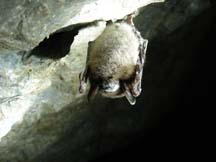A paper published on-line in the journal Nature on Wednesday dotted the scientific i’s and crossed the t’s on Geomyces destructans being the cause of white nose syndrome. Other experiments, and early news on this one, had established that white nose syndrome is caused by the fungus, but this is the official word.
During the conference call announcing the paper, several of the scientists said that the study was designed to satisfy Koch’s postulates, a term more familiar to medical researchers than wildlife researchers. The postulates map out a series of experiments that prove (or disprove) that an organism causes a disease.
Most of the time, researchers being forced to dance to Nature’s tune (or the tune of any other major scientific journal) is just part of the game of research science. This case, though, points out the inherent flaws in the system. White nose researchers have been starved for funding. Wildlife managers have been desperate for information. And while we can only hope that no wildlife manager was waiting around for confirmation from a peer-reviewed paper before taking action on white nose syndrome, I wonder if an earlier publication of this paper might have shaken a few extra pennies out of Congress’s pocket.
Read the abstract in Nature, or the whole article with a subscription or fee.
The findings are summarized in a brief article from Science News.
Photo: US Fish and Wildlife Service


Leave a Reply